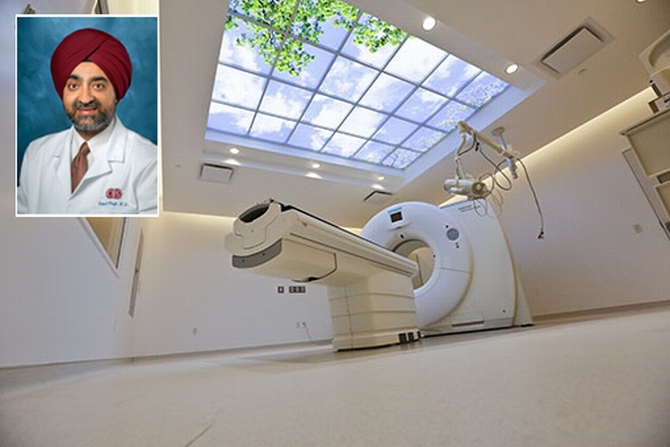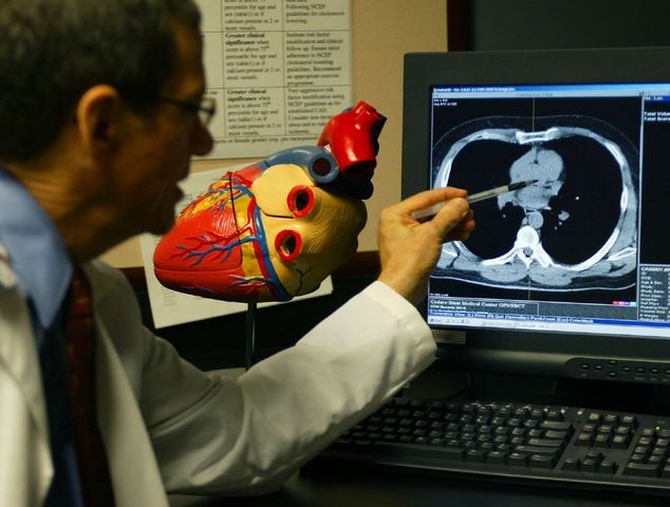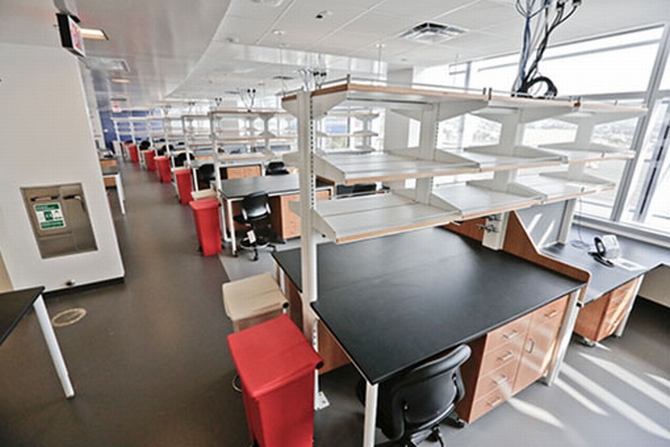Photographs: Photo courtesy: cedars-sinai.edu George Joseph
“Most people do not know the difference between a heart attack and a cardiac arrest.
In a heart attack, 90 per cent of the patients survive, while in a cardiac arrest it is only 10 per cent... The message here is, if you have these signs or symptoms, please don’t ignore them. Seek health care.”
A study called the ‘Oregon sudden unexpected death study’ has found that ‘sudden’ cardiac arrests are not as sudden as assumed, and that symptoms are there for at least a month before. George Joseph reports
The finding has attracted attention in the medical world and outside.
“We are very excited about the findings,” said Dr Sumeet Chugh, senior author of the study and associate director for genomic cardiology at the Cedars-Sinai Heart Institute in Los Angeles.
“The study has opened possibilities of intervening four weeks before the life-threatening event occurs. For us, a new door has opened.”
Till now the common belief was that sudden cardiac arrest, an electrical malfunction that stops the heart, cannot be detected earlier and occurs without many symptoms.
“Most people do not know the difference between a heart attack and a cardiac arrest,” Chugh said. “In a heart attack, 90 per cent of the patients survive, while in a cardiac arrest it is only 10 per cent.”
About 600,000 people in the United States suffer a heart attack every year, while about 360,000 face cardiac arrest. The search for an answer for the deaths from cardiac arrests led to the study, which used data of almost a million men, mostly in the Portland, Oregon area, Chugh said.
...
'Sudden cardiac arrests are not as sudden as assumed'
Image: A specialist at the institutePhotographs: Photo courtesy: cedars-sinai.edu George Joseph
“Symptoms include chest pain and shortness of breath,” he explained. “When one feels it, it is better to go for medical advice. It does not mean that you will have a heart attack or cardiac arrest because of the symptoms. But it is always better to take precautions. The message here is, if you have these signs or symptoms, please don’t ignore them. Seek health care, he said.”
If there is no medical care within 10 minutes of a cardiac arrest, chances of survival diminish.
“I don’t know any other disease that kills a person that fast,” Chugh said. “Precautions against heart attack will also help prevent cardiac arrest.”
Patients can survive if they are given cardiopulmonary resuscitation immediately and their hearts are jolted back into normal rhythm with a defibrillator.
Earlier studies mainly looked in to the possibility of symptoms one hour before the cardiac arrest. Unless the patient gets medical care in 10 minutes, it can be fatal.
The study was focused on men between 35 and 55 years of age.
“Usually, it is men in this age group who postpone the medical check up,” Chugh said. “We’re looking at how to identify the Tim Russerts and Jim Gandolfinis -- middle-aged men in their 50s who drop dead and we don’t have enough information why.”
The study examined medical records of men who had out of hospital attacks. In addition, paramedics reaching the scene of fatal attacks asked family members what signs and symptoms the patient may have had in preceding weeks.
...
'Sudden cardiac arrests are not as sudden as assumed'
Image: The Cedars-Sinai Heart Institute in Los AngelesPhotographs: Photo courtesy: cedars-sinai.edu George Joseph
“We are very much grateful to the paramedics, fire department, police and area hospitals for providing the details, which helped us,” Chugh said.
Among 567 men who had sudden arrests, researchers determined 53 per cent had symptoms beforehand. Among those with symptoms, 56 had chest pain, 13 per cent had shortness of breath and 4 per cent had dizziness, fainting or palpitations.
About 80 per cent of symptoms happened between four weeks and one hour before the cardiac arrest, the study found. And although most men had coronary artery disease, just half had been tested for it before their attacks.
One of the main reasons for cardiac arrest is genetic. High risk people can be implanted with defibrillator. It will act within 8 seconds.
“The findings were entirely unexpected,” said Chugh, an expert on heart rhythm abnormalities who holds the Pauline and Harold Price Endowed Chair in Cardiac Electrophysiology Research at Cedars-Sinai.
“We never thought more than half of these middle-aged men would have had warning signs so long before their cardiac arrests. Previously, we thought most people don’t have symptoms so we can’t do anything about it.”
Chugh said he and his colleagues are also attempting to identify people at risk by comparing biologies of those that have had sudden cardiac arrests with sample populations in Portland that have never had cardiac arrests.
TOP photo features you missed last week
...




article